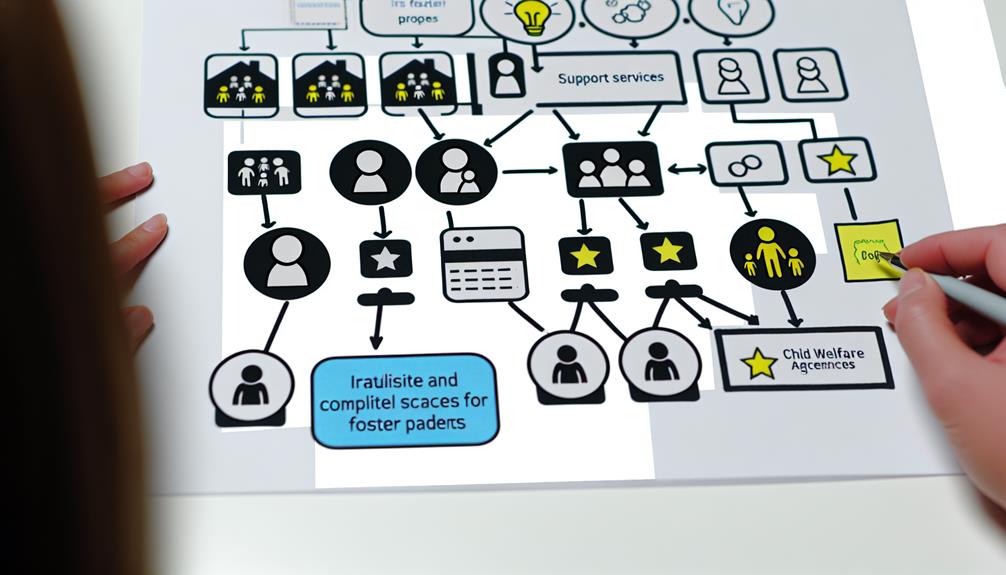UK foster parenting can seem intricate, but with training and support, you'll effectively care for children in need. Initial training provides a thorough understanding of the system, alongside coping strategies. Building resilience and emotional intelligence in yourself and the children are key skills you'll develop. Support networks and resources, including workshops, online communities, and mental health resources, offer aid and advice. And don't worry about financing; foster care allowances and additional supports aid in covering costs. Legal understanding will clarify your responsibilities. Ready to learn how to handle challenges and access additional financial support? Let's journey deeper.
Key Takeaways
- Foster care training in the UK focuses on understanding the system, nurturing children effectively, and building resilience.
- Parenting workshops, support groups, and online communities provide practical advice, emotional support, and resources.
- Continuous training and development programs cover various topics from understanding trauma to managing health and education needs.
- Mental health resources are available to assist foster parents in managing stress and ensuring emotional wellbeing.
- Financial aid, including foster care allowances and additional support options, are available to assist foster parents in the UK.
Understanding UK Foster Care System

Often, maneuvering through the UK foster care system can seem challenging, but grasping its structure and operations is essential for prospective foster parents. It's not merely about understanding the rules or finding your way through the paperwork; it's about appreciating the wider context and recognizing the needs that drive the system.
Let's start with foster care demographics. There's a wide range of children in care, varying in age, background, and personal circumstances. Some might be dealing with the aftermath of abuse or neglect, others may be unaccompanied asylum-seeking children. Getting a grip on these demographics assists in understanding the diverse needs of children in foster care, preparing you for the care placement process.
Understanding the care placement process is equally important. It's not a random selection; it's a meticulous procedure based on the child's needs and the potential foster parent's capabilities. The authorities consider factors like age, gender, cultural background, and the child's experiences before deciding on a placement. They also evaluate your skills, home environment, and support network. The goal is to create a beneficial match for both the child and you.
Basic Training for Foster Parents
As you step into the role of a UK foster parent, a fundamental understanding of foster care is essential. Acquiring the necessary skills can empower you to nurture the children in your care effectively.
Let's navigate through the training courses available to equip you with these key abilities.
Understanding Foster Care
What does it truly mean to be a foster parent in the UK?
It's more than just providing a roof over a child's head. It's about understanding the unique challenges these children face and helping them navigate through them.
You'll encounter foster care myths that can paint a skewed picture of what to expect. The reality is, each foster child is different, with their own set of experiences and needs.
Child attachment issues are common, and it's vital to recognize and address them appropriately.
It's not always easy, but the rewards of seeing a child grow and thrive in a loving, supportive environment make it all worthwhile.
As a foster parent, you're not just caring for a child, you're changing a life.
Skills for Foster Parents
To equip yourself with the necessary skills to support these unique needs, understanding the basic training that foster parents undergo in the UK becomes invaluable. Emotional resilience is one of the key attributes you'll need to cultivate. This ability to bounce back from adversity and maintain your emotional stability in challenging situations is essential in foster care.
Your parenting style also plays an essential role. You'll need to adapt your approach to match the individual needs of each child, ensuring they feel safe, valued and understood. It's a delicate balance, requiring patience, understanding and a willingness to learn.
With the right training and support, you can become the stable and caring presence these children need.
Navigating Training Courses
Understanding the ins and outs of foster parent training courses isn't always straightforward, but don't worry, we're here to guide you through it. When maneuvering these courses, consider the below Course Selection Tips:
- Understand your needs: Different courses cater to different needs. Consider the child's age, special needs, and your own experience level.
- Look for thorough content: Courses should cover a range of topics, from child development to handling behavioral issues.
- Check for certifications: Confirm the course is accredited and aids in the Certification Process.
Advanced Skills for Foster Care
Developing advanced skills for foster care can greatly enhance your ability to provide a nurturing and supportive environment for foster children. Key among these skills are building resilience and fostering emotional intelligence.
Resilience is the ability to bounce back from adversity. It's not about avoiding difficult situations, but rather, it's about equipping your foster child with the confidence and coping mechanisms to navigate life's inevitable challenges. You can build resilience by fostering a strong, trusting relationship with your foster child, providing stability, and teaching problem-solving skills.
Emotional intelligence, on the other hand, is the ability to understand and manage emotions – both your own and those of others. It's pivotal in forming effective relationships and can be particularly beneficial in managing the complex emotions often experienced by foster children. You can foster emotional intelligence by demonstrating empathy, encouraging open communication, and teaching your foster child how to recognise and express their feelings appropriately.
Accessing Support Networks in the UK

While honing advanced skills in foster care is invaluable, finding and utilising support networks within the UK also plays a significant role in your journey as a foster parent. These networks provide a lifeline when you're confronted with challenges and uncertainties. They're an excellent source of practical advice, emotional support, and resources.
Here are three ways to access these networks:
- Parenting Workshops: These offer opportunities to learn new strategies, hear from experienced foster parents, and engage with professionals in the field. They're often tailored to address specific challenges you might encounter in your foster parenting journey.
- Support Groups: Joining such groups allows you to share experiences, learn from others, and gain reassurance that you're not alone. They're a haven where you can express your fears, frustrations, and joys with people who truly understand.
- Online Communities: These provide immediate access to a wealth of information and a diverse community of foster parents. They're a convenient option, especially when you need quick advice or late-night reassurances.
Mental Health Resources for Foster Parents
Traversing the emotional landscape of foster parenting can be challenging, but you're not alone – numerous mental health resources are available to support you in the UK. These resources provide essential tools for stress management, offering practical strategies to manage your emotional wellbeing while caring for a foster child.
One of the most valuable mental health resources is therapeutic interventions. These are designed to help you navigate and cope with the emotional demands of foster parenting. Therapy can equip you with coping mechanisms, help you understand and manage your reactions, and provide a safe, confidential space to express your feelings.
Several organizations, such as the Mental Health Foundation and Fosterline, offer these resources tailored to foster parents. They provide helplines, counselling services, mental health training, and online resources. They understand the unique challenges you face and are prepared to support you every step of the way.
Financial Aid for UK Foster Families

As a foster parent in the UK, you might be wondering about the financial aid available to you.
It's important to grasp the foster care allowances and the additional financial support options that may be accessible.
Let's explore these crucial aspects to make sure you're fully equipped for your fostering journey.
Understanding Foster Care Allowances
To assist you in your fostering journey, it's important to grasp the financial aid available, particularly the foster care allowances in the UK. This allowance is a key component of foster care, designed to cover the cost of caring for a foster child.
- Allowance Management: It's important to manage this allowance efficiently. It should cover the child's needs, from food and clothing to educational resources and leisure activities.
- Tax Implications: Foster caregivers are entitled to tax exemptions and reliefs, making the allowance more advantageous.
- Regular Reviews: The allowance is regularly assessed to make sure it meets the cost of care.
Understanding these elements will equip you with the knowledge to navigate the financial aspects of fostering effectively. Keep in mind, additional financial support options are also available.
Additional Financial Support Options
Beyond the full foster care allowance, there's a variety of additional financial support options that you, as a UK foster family, can access.
Childcare Expenses may be reimbursed, providing relief from costs associated with day-to-day care needs.
There's also Education Funding available for children and young adults in foster care, ensuring they've equal opportunities to excel academically.
Some local authorities offer rent and council tax discounts, too.
Don't overlook the Disability Living Allowance, if you're fostering a child with disabilities. It's crucial to understand these provisions and how to apply for them, as they can greatly lessen the financial burden.
Legal Framework in Foster Parenting
Understanding the legal framework in foster parenting can be demanding, but it's essential for providing the best care possible for your foster child. It's vital to be aware of your responsibilities and your foster child's rights.
- Legal Guardianship: As a foster parent, you're entrusted with the day-to-day care of the child, but the legal guardianship typically remains with the local authority or birth parents. This means you'll need to consult with them for major decisions.
- Child's Rights: Now, your foster child has certain rights, like the right to a safe and secure home, the right to education, and the right to maintain contact with their birth family. You're responsible for ensuring these rights are upheld.
- Support and Guidance: The local authority will provide you with guidance and support in legal matters. Make sure you have a good understanding of your role, the child's rights, and the local authority's expectations.
Continuous Training Opportunities

As a foster parent in the UK, you'll never be left in the dark when it comes to learning new skills, thanks to the continuous training opportunities available. These training programs are specifically designed to enhance your effectiveness as a foster parent. They cover a wide spectrum of topics, from understanding trauma and behavioural issues to managing health and education needs of the child.
The beauty of these training opportunities lies in their personalised learning approach. Recognising that each foster parent's experience and challenges are unique, the training is adapted to your specific needs. Whether you're a novice or a seasoned foster parent, you'll find a training module that fits your requirements.
Training effectiveness is a major focus in these programs. The goal isn't just to equip you with knowledge, but to make sure you can effectively apply what you've learned in real-life situations. Regular feedback and assessment are integral parts of these programs to guarantee you're making the desired progress.
Continuous training isn't just about problem-solving, but also about empowering you to provide the best possible care for your foster child. So, take full advantage of these opportunities to enhance your parenting skills.
Overcoming Challenges in Foster Parenting
Traversing the waters of foster parenting can be complex and challenging, yet with the right resources and support, you're capable of turning these hurdles into opportunities for growth.
- Adoption Considerations: Every child you foster brings a unique set of experiences and needs. It's important to understand the specifics of their situation. If you're considering adoption, you'll need to factor in the child's history, their feelings about adoption, and the legal requirements. Foster parenting isn't just about providing a home, it's about offering a supportive, understanding environment where a child can thrive.
- Cultural Sensitivity: Often, you'll be fostering children from different cultural backgrounds. It's vital to acknowledge and respect their heritage. This means learning about their culture, incorporating it into your home life, and ensuring they maintain a connection to their roots.
- Support and Training: Challenges are easier to manage with ongoing support and training. Engage with support groups, attend training sessions, and don't hesitate to ask for help when needed.
Frequently Asked Questions
What Is the Process for Becoming a Foster Parent in the Uk?
To become a UK foster parent, you'll undergo an assessment process, including financial implications and foster home inspections. You'll also receive training and support to make sure you're fully prepared for the rewarding challenge.
Can Single Individuals or People Without Children of Their Own Become Foster Parents?
Absolutely, you can become a foster parent, regardless of your single or childless status. You'll face unique 'Single Parent Challenges' and 'Childless Fostering Perspectives', but with dedication, you can offer a child a loving home.
Are There Any Specific Age or Health Requirements to Be a Foster Parent in the Uk?
Yes, there are age and health requirements in UK's foster criteria. You've to be over 21 with good health. Health assessments are conducted to make sure you're physically and mentally capable of fostering a child.
How Can We Manage the Relationship Between Our Biological Children and Foster Children?
To handle the relationship between your biological and foster children, you'll need to tackle sibling rivalry and facilitate emotional adjustment. It's important to guarantee fair treatment, foster open communication, and provide individual attention to all children.
How Long Does a Foster Child Typically Stay With a Foster Family?
The duration a foster child stays with you varies. It's a dance, sometimes lasting months, other times years. Foster Duration Impact and Adjustment Challenges can occur, but they're part of the rewarding journey.
Conclusion
Traversing the UK foster care system isn't easy, but it's worth it. With basic and advanced training, you'll be equipped to provide a loving home. Use available support networks, mental health resources, and financial aid to bolster your journey.
Understand the legal framework, seize continuous learning opportunities, and tackle challenges head-on. Remember, as a foster parent, you're never alone – there's always help and guidance at your fingertips.
Stay committed, stay informed, and most importantly, stay compassionate.




